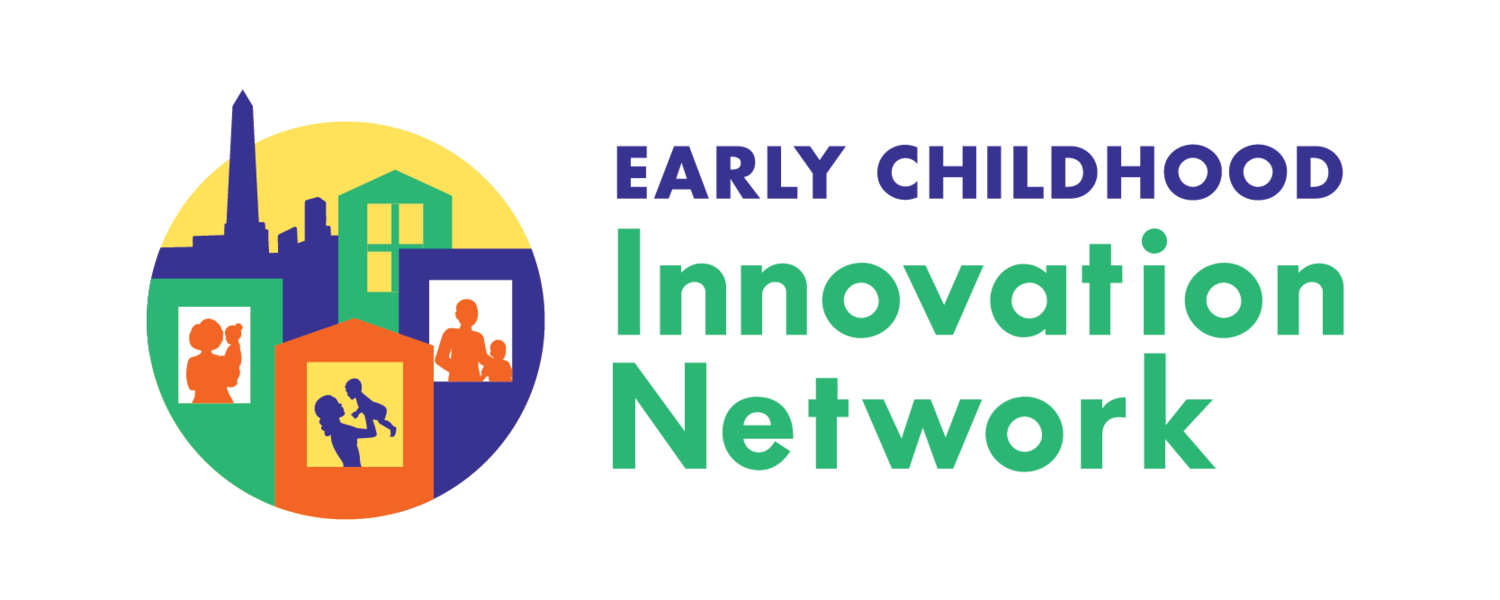Innovation Spotlight: Racial Equity Community of Practice (RECoP)
In June 2020, ECIN’s directors issued a public statement on behalf of the entire ECIN team that stated: “Recent events have affirmed what so many families in Washington, D.C., already knew: That racism and oppression continue to disrupt and devalue the lives of children and families, and that much of the trauma and adversity experienced by young children growing up in the nation’s capital is directly related to the long legacy of injustice and violence inflicted upon Black, Brown, and Indigenous People in the United States up to this very day.”
“We are committed to continually examining ourselves and our work in order to ensure that ECIN’s efforts in developing multi-generational strategies to promote healthy child development are directly in the service of undoing racism and promoting a more equitable and just environment for DC’s children and families.”
Anti-Racist Principles Used by RECoP
The People’s Institute for Survival and Beyond
Analyze power
Develop Leadership
Gatekeeping
Identifying & Analyzing Manifestations of Racism
Learning from History
Maintaining Accountability
Sharing Culture
Undoing Internalized Racial Oppression
Undoing Racism
The drive to achieve this is ingrained throughout all of ECIN’s team and underlies everything the network does for children and families in the nation’s capital.
One way ECIN has actively embraced the advancement of racial equity and dedication to anti-racism is the Racial Equity Community of Practice (RECoP), a monthly gathering of ECIN’s community and network partners, leaders, and staff. The idea launched following an Undoing Racism training led by a group called Equity Matters. The conversations during the training sparked the idea to gather ECIN team members from every background to form an official Community of Practice that meets monthly to discuss addressing racism and building racial equity.
Today, the RECoP is a network of learning that gathers people with the shared interest of addressing structural racism and other social determinants of health. It focuses on building three key competencies:
Shared content knowledge: Collaboratively working toward a shared understanding of the language associated with critical race theory tenets as well as key issues, concepts, models, and practices related to racial equity in the United States.
Personal practice: The willingness and ability needed to reflect on one’s own racial, ethnic, and cultural identities within the framework of racial equity in the U.S. and to engage in meaningful dialogue about these identities with colleagues.
Deliberate practice: An intentional professional application and capacity to reflect and identify how racial equity and anti-racism relates to one’s everyday life experiences and professional work with racial equity goals.
“It’s a shared learning journey,” says Arrealia Gavins, ECIN’s director of Practice, who has participated in almost all of the sessions and now helps to plan and facilitate them. “In a community of practice, there is no expert. We come to the space with shared experiences and shared purpose to learn from one another.”
RECoP seeks to intentionally invest in creating a team atmosphere with a culture of humility focused on healing-centered practices “We learn together, problem solve, and come up with ways we might promote racial equity,” Arrealia says.
Each session starts with a recap of the group’s ground rules, to establish shared expectations for every discussion, including:
Presume good intentions
Welcoming diverse perspectives
Be your whole self
Ask questions
WAIT (Why am I talking? Why aren’t I talking?)
Tact
Call out power dynamics
Safe Space/Brave Space
Willingness to hear/digest what was said
Mindfulness
Sometimes RECoP discussions and activities are driven by a photovoice image or article reading, or even a video presentation (like this one, for example, by David R. Williams, “How racism makes us sick”). Participants are asked to share how they experienced and reacted to the assigned piece. Sometimes, the group simply reflects on a virtue needed to promote social justice.
The RECoP has helped take the anti-racist efforts of the organization to the next level. Some of ECIN’s anti-racist achievements so far include:
RECoP anti-racist goals mapped out in the project work plan for every innovation. These programmatic equity goals often focus on how to better integrate families and their own lived experiences, in their own words, into the co-creation of innovations that seek to reach these groups of people.
Development of racial equity authorship guidelines for dissemination of research findings.
Each team member also incorporates reflective practice to identify and develop their own anti-racist practice.
The engagement and participation of a diverse group in RECOP is key to its success, and collaboration has continued throughout 2020 and into 2021, despite the COVID-19 pandemic shifting in person, informal gatherings to a virtual setting.
Next, the team hopes to begin a more deliberate approach to tracking and measuring individual progress toward racial equity goals to make them a more consistent part of everyone’s daily work.
Arrealia says, “We want to be more outcome-based in terms of our confidence and abilities to successfully advance racial equity and on our personal journey.”
Anti-Racism Resources
As a part of our commitment to becoming an anti-racist organization, each edition of this newsletter will share a few educational resources for adults and children that are focused on undoing racism. This month, we have specifically included a resource addressing Asian American/Pacific Islander (AAPI) racism in light of the continued incidents of AAPI violence and hate we have seen over the past month. Sadly, these experiences are not unique or new and remind us of the importance of continuing to combat racism in all forms. Additionally, we are regularly updating our racial equity resource list, which can be found here, and will continue to do so.
The Pandemics of Racism and COVID-19: Danger and Opportunity, Pediatrics (pdf)
The Racial Wealth Gap in America, The Urban Institute (video)
16 ways to help children become thoughtful, informed and BRAVE about race, EmbraceRace (pdf)
Talking Productively About Race in the Colorblind Era, Kirwan Institute Research Report (pdf)
We encourage you to spend time on a regular basis learning more about both the historical context of racism, and the current experience and impact of racism in today’s world. We also encourage each of you, and especially our White colleagues, to continually learn more about how you can be actively anti-racist and make a personal commitment to action.
Meet Our Team
Olivia soutullo, ph.d.
Did you know that ECIN has more than 92 team members working across Washington, D.C. to improve the lives of young children and their families? Future newsletters will feature more about the people doing this work every day. This edition, we’re highlighting Olivia Soutullo from Children’s National Hospital.
Who: Olivia Soutullo, Ph.D.
Where: Community Mental Health CORE (Collaboration, Outreach, Research, Equity) of the Children's National Hospital Child Health Advocacy Institute
Her Work: Olivia is a licensed psychologist specializing in pediatric and clinical child/adolescent psychology. Within the Community Mental Health CORE, she focuses on projects related to mental health systems integration. She leads the Early Childhood Behavioral Health Working Group of the Family and Youth Committee of the Coordinating Council, contributes to a SAMHSA grant on mental health awareness training for early childhood educators and families with several other ECIN team members, and coordinates Parent-Child Interaction Therapy in the Children's National Division of Psychology and Behavioral Health. Her research and clinical interests focus on facilitating partnerships between patients’ families and pediatric care providers.
What she wants you to know: She recently led development of a landmark assessment, Current Landscape of Behavioral Health Services for Children with Autism Spectrum Disorder Insured by Medicaid in Washington, D.C. It’s a must read!
News and Announcements
BUILD Initiative’s ELAN Fellowship Selects ECIN Program Coordinator
Susan caleb-harris joins the elan fellowship
Congratulations to Susan Caleb-Harris, who was chosen to participate in the second cohort of the BUILD Initiative's Equity Leaders Action Network (ELAN) Fellowship. The ELAN Fellowship is designed to nurture a community of leaders who work together to support, critique, and strengthen their shared commitment to building early childhood systems in which race and place no longer determine child outcomes and family well-being. Additionally, ELAN aims to build the capacity of fellows to critically examine, with racial equity processes, tools and concepts, institutional and structural policies and practices for distributing state and federal resources (e.g., funding and services).
For the next two years, Susan will work together with ELAN fellows from all over the country to identify, address, and take action to resolve inequities experienced by young children (prenatal to age 5), their families, and communities. The BUILD Network will support Susan and her work by offering opportunities to learn from faculty, peers, and other state and national leaders, and to share ideas and form relationships to support her to think and act strategically to remediate marginalization.



